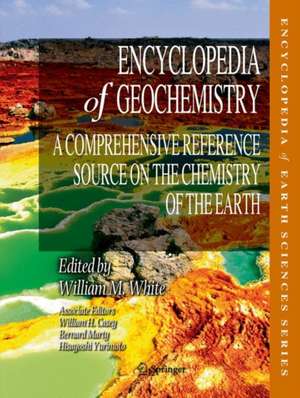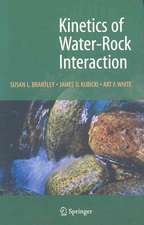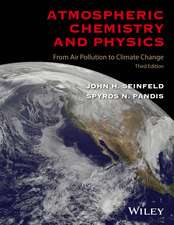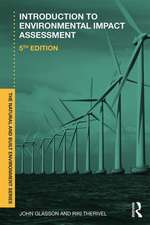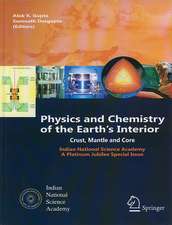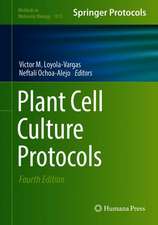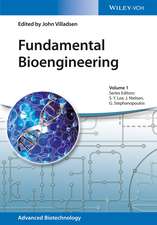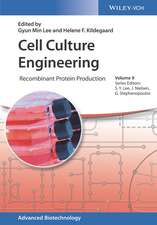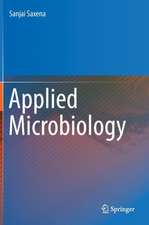Encyclopedia of Geochemistry: A Comprehensive Reference Source on the Chemistry of the Earth: Encyclopedia of Earth Sciences Series
Editat de William M. White William H. Casey, Bernard Marty, Hisayoshi Yurimotoen Limba Engleză Hardback – 28 iul 2018
Geochemistry applies chemical techniques and approaches to understanding the Earth and how it works. It touches upon almost every aspect of earth science, ranging from applied topics such as the search for energy and mineral resources, environmental pollution, and climate change to more basic questions such as the Earth’s origin and composition, the origin and evolution of life, rock weathering and metamorphism, and the pattern of ocean and mantle circulation. Geochemistry allows us to assign absolute ages to events in Earth’s history, to trace the flow of ocean water both now and in the past, trace sediments into subduction zones and arc volcanoes, and trace petroleum to its source rock and ultimately the environment in which it formed. The earliest of evidence of life is provided by chemical and isotopic traces, not fossils, preserved in rocks. Geochemistry has allowed us to unravel the history of the ice ages and thereby deduce their cause. Geochemistry allows us to determine the swings in Earth’s surface temperatures during the ice ages, determine the temperatures and pressures at which rocks have been metamorphosed, and the rates at which ancient magma chambers cooled and crystallized. The field has grown rapidly more sophisticated, in both analytical techniques that can determine elemental concentrations or isotope ratios with exquisite precision and in computational modeling on scales ranging from atomic to planetary.
Din seria Encyclopedia of Earth Sciences Series
- 18%
 Preț: 3655.93 lei
Preț: 3655.93 lei - 18%
 Preț: 3123.97 lei
Preț: 3123.97 lei - 18%
 Preț: 2565.22 lei
Preț: 2565.22 lei - 18%
 Preț: 2828.03 lei
Preț: 2828.03 lei - 18%
 Preț: 3380.49 lei
Preț: 3380.49 lei - 18%
 Preț: 3917.94 lei
Preț: 3917.94 lei - 18%
 Preț: 3354.74 lei
Preț: 3354.74 lei - 18%
 Preț: 3664.42 lei
Preț: 3664.42 lei - 18%
 Preț: 1901.16 lei
Preț: 1901.16 lei - 18%
 Preț: 3381.42 lei
Preț: 3381.42 lei - 18%
 Preț: 3041.93 lei
Preț: 3041.93 lei - 18%
 Preț: 3055.49 lei
Preț: 3055.49 lei - 24%
 Preț: 2488.11 lei
Preț: 2488.11 lei - 24%
 Preț: 2672.36 lei
Preț: 2672.36 lei - 18%
 Preț: 1849.26 lei
Preț: 1849.26 lei - 24%
 Preț: 3581.28 lei
Preț: 3581.28 lei - 18%
 Preț: 2802.01 lei
Preț: 2802.01 lei - 24%
 Preț: 1685.69 lei
Preț: 1685.69 lei - 18%
 Preț: 3335.19 lei
Preț: 3335.19 lei - 24%
 Preț: 2953.23 lei
Preț: 2953.23 lei - 24%
 Preț: 1685.16 lei
Preț: 1685.16 lei - 24%
 Preț: 1689.69 lei
Preț: 1689.69 lei - 14%
 Preț: 2198.30 lei
Preț: 2198.30 lei - 9%
 Preț: 1677.87 lei
Preț: 1677.87 lei - 14%
 Preț: 1632.61 lei
Preț: 1632.61 lei - 14%
 Preț: 1849.25 lei
Preț: 1849.25 lei - 14%
 Preț: 2571.45 lei
Preț: 2571.45 lei - 14%
 Preț: 1945.55 lei
Preț: 1945.55 lei - 14%
 Preț: 1945.55 lei
Preț: 1945.55 lei - 14%
 Preț: 1945.55 lei
Preț: 1945.55 lei - 14%
 Preț: 1945.55 lei
Preț: 1945.55 lei - 9%
 Preț: 2703.17 lei
Preț: 2703.17 lei - 14%
 Preț: 1945.55 lei
Preț: 1945.55 lei - 14%
 Preț: 1945.55 lei
Preț: 1945.55 lei - 14%
 Preț: 2130.90 lei
Preț: 2130.90 lei
Preț: 3984.35 lei
Preț vechi: 4858.97 lei
-18% Nou
762.49€ • 827.96$ • 640.50£
Carte disponibilă
Livrare economică 02-16 aprilie
Specificații
ISBN-10: 3319393111
Pagini: 1680
Ilustrații: XXXIII, 1557 p. 524 illus., 379 illus. in color. In 2 volumes, not available separately.
Dimensiuni: 210 x 279 x 40 mm
Greutate: 4.84 kg
Ediția:1st ed. 2018
Editura: Springer International Publishing
Colecția Springer
Seria Encyclopedia of Earth Sciences Series
Locul publicării:Cham, Switzerland
Cuprins
Ab Initio Calculations.- Acid-Base Reactions.- Activation Energy, Activation Enthalpy, Activation Volume.- Activity and Activity Coefficients.- Analytical Techniques.- Antimony.- Aqueous Solutions.- Arsenic.- Atomic Absorption Spectrometry.- Banded Iron Formations (BIFs).- Cadmium.- Chelation.- Chemical Bonds.- Chromium.- Clay Membranes.- Clay Minerals.- Colloids.- Complexes .- Critical Points.- Debye-Hückel Equation.- Density Functional Theory.- Diagenesis.- Differential Thermal Analysis and Scanning Calorimetry.- etc.
Recenzii
Notă biografică
After receiving his B.A. in geology from the University of California, Berkeley, William White earned a Ph.D. in oceanography from the University of Rhode Island in 1977. White did postdoctoral work at the Carnegie Institution of Washington and at the U.S. Geological Survey in Denver between 1977 and 1980. From 1980 to 1985 he was a staff scientist at the Max Planck Institut für Chemie in Mainz, Germany, and then spent a year as associate professor in the College of Oceanography at Oregon State University. White joined the Cornell faculty in 1986 where he currently serves as professor of earth and atmospheric sciences. He spent seven months of 1995 as a visiting professor at the École Normale Supérieure de Lyon and the Université de Rennes, served as a visiting professor at the Université de Brest in 2001-2002, and was a Merle Tuve Senior Fellow at Carnegie Institution of Washington in 2002. White is a fellow of the Geochemical Society and the American Geophysical Union. He served as founding editor of the electronic journal Geochemistry, Geophysics, Geosystems (G-cubed) from 1999 to 2005.
Textul de pe ultima copertă
The Encyclopedia is a complete and authoritative reference work for this rapidly evolving field. Over 300 international scientists, each experts in their specialties, have written over 330 separate topics on different aspects of geochemistry including geochemical thermodynamics and kinetics, isotope and organic geochemistry, meteorites and cosmochemistry, the carbon cycle and climate, trace elements, geochemistry of high and low temperature processes, and ore deposition, to name just a few. The geochemical behavior of the elements is described as is the state of the art in analytical geochemistry. Each topic incorporates cross-referencing to related articles, and also has its own reference list to lead the reader to the essential articles within the published literature. The entries are arranged alphabetically, for easy access, and the subject and author indices are comprehensive and extensive.
Geochemistry applies chemical techniques and approaches to understanding the Earth and how it works. It touches upon almost every aspect of earth science, ranging from applied topics such as the search for energy and mineral resources, environmental pollution, and climate change to more basic questions such as the Earth’s origin and composition, the origin and evolution of life, rock weathering and metamorphism, and the pattern of ocean and mantle circulation. Geochemistry allows us to assign absolute ages to events in Earth’s history, to trace the flow of ocean water both now and in the past, trace sediments into subduction zones and arc volcanoes, and trace petroleum to its source rock and ultimately the environment in which it formed. The earliest of evidence of life is provided by chemical and isotopic traces, not fossils, preserved in rocks. Geochemistry has allowed us to unravel the history of the ice ages and thereby deduce their cause. Geochemistry allows us to determine the swings in Earth’s surface temperatures during the ice ages, determine the temperatures and pressures at which rocks have been metamorphosed, and the rates at which ancient magma chambers cooled and crystallized. The field has grown rapidly more sophisticated, in both analytical techniques that can determine elemental concentrations or isotope ratios with exquisite precision and in computational modeling on scales ranging from atomic to planetary.
Caracteristici
Clear concise summaries of all topics in geochemistry
Covers both theory and application of geochemistry in a wide range of earth science topics
Descriere
The Encyclopedia is a complete and authoritative reference work for this rapidly evolving field. Over 300 international scientists, each experts in their specialties, have written over 330 separate topics on different aspects of geochemistry including geochemical thermodynamics and kinetics, isotope and organic geochemistry, meteorites and cosmochemistry, the carbon cycle and climate, trace elements, geochemistry of high and low temperature processes, and ore deposition, to name just a few. The geochemical behavior of the elements is described as is the state of the art in analytical geochemistry. Each topic incorporates cross-referencing to related articles, and also has its own reference list to lead the reader to the essential articles within the published literature. The entries are arranged alphabetically, for easy access, and the subject and author indices are comprehensive and extensive.
Geochemistry applies chemical techniques and approaches to understanding the Earth and how it works. It touches upon almost every aspect of earth science, ranging from applied topics such as the search for energy and mineral resources, environmental pollution, and climate change to more basic questions such as the Earth’s origin and composition, the origin and evolution of life, rock weathering and metamorphism, and the pattern of ocean and mantle circulation. Geochemistry allows us to assign absolute ages to events in Earth’s history, to trace the flow of ocean water both now and in the past, trace sediments into subduction zones and arc volcanoes, and trace petroleum to its source rock and ultimately the environment in which it formed. The earliest of evidence of life is provided by chemical and isotopic traces, not fossils, preserved in rocks. Geochemistry has allowed us to unravel the history of the ice ages and thereby deduce their cause. Geochemistry allows us to determine the swings in Earth’s surface temperatures during the ice ages, determine the temperatures and pressures at which rocks have been metamorphosed, and the rates at which ancient magma chambers cooled and crystallized. The field has grown rapidly more sophisticated, in both analytical techniques that can determine elemental concentrations or isotope ratios with exquisite precision and in computational modeling on scales ranging from atomic to planetary.
